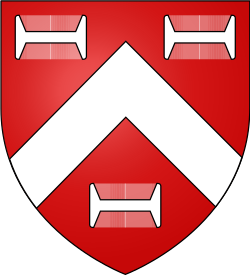This article includes a list of general references, but it lacks sufficient corresponding inline citations .(November 2018) |
| Baron Sysonby | |
|---|---|
  | |
| Creation date | 24 June 1935 |
| Created by | George V |
| Peerage | United Kingdom |
| First holder | Frederick Ponsonby |
| Last holder | John Ponsonby |
| Remainder to | the 1st Baron's heirs male of the body lawfully begotten. |
Baron Sysonby, of Wonersh in the County of Surrey, was a title in the Peerage of the United Kingdom. It was created in 1935 for the soldier and courtier Sir Frederick Ponsonby. [1] He was the second son of Sir Henry Ponsonby, grandson of Frederick Ponsonby, 3rd Earl of Bessborough, while Arthur Ponsonby, 1st Baron Ponsonby of Shulbrede, was his younger brother. The barony became extinct on the death of his grandson, the 3rd Baron, in 2009.